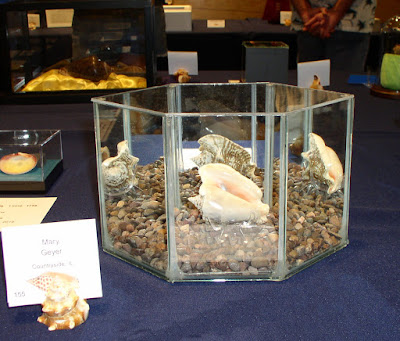Sign board of the Sanibel Community House, location of the Annual Shell Show
Front yard of the Community House, facing Periwinkle Way
The outdoor shell festival itself is free. It features shells, shell art, crafts, and books for sale. Admission to the shell show indoor exhibit in the Sanibel Community House is a $5 per-person donation. With this you also receive a bag of shells and a half-price ticket to the Bailey-Matthews Shell Museum.
A vendor’s tent at the Shell Festival
Portico of the Community House and entrance to the shell show
Sandwich board advertisement for the show
Inside the shell show, competitive categories consist of the Scientific Division and the Artistic Division. Shell collectors and artists from around the world take part in the competition, and awards are made in a variety of categories. The 2019 festival brought in nearly 4,000 people to the exhibit hall at the Sanibel Community House. Chances are the festival this year will be bigger than ever.
Overview of the exhibit space
The Grand Hall exhibit area of the Scientific Division is in the foreground. In the background is the adjoining Community Room, where the Artistic Division is on display. The Scientific Division focuses on single shells and shell collections from Florida and around the world. The Artistic Division features works of art created primarily with shells and other sea life.
Bob, a visitor from Boston, looking over the exhibit
Pink Conch Shell
Shells of the Florida Keys
Hawk Wing Conch, Sanibel Island
Florida Fighting Conch from Blind Pass, Sanibel Island
True Tulip, Sanibel Island
Giant Atlantic Pyram, West Eleuthera, Bahamas
Gold Banded Cone, Kice Island (near Marco Island), Intertidal
Endive Murex, Bantayan Island, Cebu, Philippines
Turbinella laffertyi, Sofala Beira, Mozambique
Epitonium
This shell received the award of “Shell of the Show.” It was dredged at 100 fathoms, near Santa Cruz Island, Galapagos Islands
Shells of the Florida Keys
Hawk Wing Conch, Sanibel Island
Florida Fighting Conch from Blind Pass, Sanibel Island
True Tulip, Sanibel Island
Giant Atlantic Pyram, West Eleuthera, Bahamas
Gold Banded Cone, Kice Island (near Marco Island), Intertidal
Endive Murex, Bantayan Island, Cebu, Philippines
Turbinella laffertyi, Sofala Beira, Mozambique
Epitonium
This shell received the award of “Shell of the Show.” It was dredged at 100 fathoms, near Santa Cruz Island, Galapagos Islands
Spiraling shells
Speckled Swimming Crab, Kice Island, Florida
Horseshoe Crab
Ammonite, Somerset, England
Photo Op with half-body mannequins embellished with shell swimsuits
Meet Sandy the Sunbather and Hank the Hunk
Overview of the Community Room, where the Artistic Division was on display
Floral Shell creations
Floral shell creations
Shell Chrysanthemums
Shell wreaths
Shell-framed mirror
Shell peonies
Shell rose
Shell lamps
Sip N Shell shop
Mashamboy Initiation Mask, Kuba Tribe, Democratic Republic of Congo, West Africa
Shell pumpkin
Shell Christmas tree
Shell-decorated jacket
Beach scene
Butterfly (?) sea life creation
Hand-carved turtle and seascape
Mashamboy Initiation Mask, Kuba Tribe, Democratic Republic of Congo, West Africa
Shell pumpkin
Shell Christmas tree
Shell-decorated jacket
Beach scene
Butterfly (?) sea life creation
Hand-carved turtle and seascape
Orange-tinged seashell design
Sailing ship
Van Gogh’s Café Terrace at Night rendered in shells
The Mermaid Crown by Todd Alan made from gold and platinum and diamonds and other precious stones.
Van Gogh’s Café Terrace at Night rendered in shells
The Mermaid Crown by Todd Alan made from gold and platinum and diamonds and other precious stones.
Adorned jewelry box
Pink Sailor’s Valentine
Sailor’s Valentines are a form of seashell art, popular in the 1800s, when sailors brought them home to their wives, girl friends, mothers or sisters. This is the traditional octagonal shape.
Sailor’s Valentines
Most Sailor’s Valentines were made in the West Indies on the island of Barbados between 1830 & 1880. People thought that sailors made them aboard ships, but in reality, almost all were made in Barbados for sale to British & American sailors.
Oval tray
White Cornflower
US flag
Seahorse shell creation
After viewing the show, we were supposed to vote for our favorite in both categories, scientific and artistic. This was an impossible task--there were just too many beautiful displays, but the seahorse in the artistic display and the endive murex in the scientific category were standouts for me. What did you think?






















































